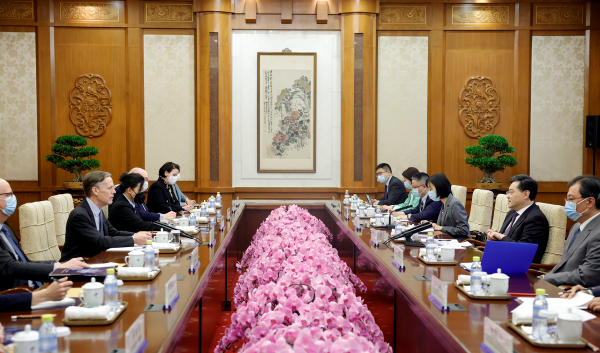Following a slew of “erroneous comments and deeds” that plunged Sino-U.S. relations back into a deep freeze, China’s Foreign Minister Qin Gang stated on Monday that it is critical to stabilise relations.
In a meeting with Nicholas Burns, the U.S. ambassador to China, Qin emphasised that the United States must improve the way it has handled the Taiwan problem and cease undermining the “one China” tenet.
When Nancy Pelosi, who was then speaker of the House of Representatives, paid an official visit to democratic Taiwan last year, it enraged China, which asserts sovereignty over the island and caused a low point in ties between the two largest economies in the world.
In retaliation, Beijing cut off formal channels of communication with the US, including one between their troops.
According to the Chinese Foreign Ministry, Qin warned Burns that stabilising Sino-U.S. relations, preventing a downward spiral, and averting any mishaps between China and the United States are urgent priorities.
When U.S. and Chinese leaders Joe Biden and Xi Jinping met at a G20 conference in Bali last November and committed to more frequent communication, the tension between the two nations had subsided.
But tensions flared again in February when a Chinese high-altitude balloon appeared in U.S. airspace and in response U.S. Secretary of State Antony Blinken cancelled a visit to Beijing.
“A series of erroneous words and deeds by the United States since then have undermined the hard-won positive momentum of Sino-U.S. relations,” Qin said.
“The agenda of dialogue and cooperation agreed by the two sides has been disrupted, and the relationship between the two countries has once again encountered cold ice.”
‘CHALLENGES’
Burns, in a post on Twitter about his talks with Qin, also spoke of the need to bring stability to the relationship.
“We discussed challenges in the U.S.-China relationship and the necessity of stabilising ties and expanding high-level communication,” Burns said.
Last week, Blinken appeared to offer hope of a visit, telling the Washington Post that it was important to re-establish regular lines of communication at all levels.
Also last week, U.S. climate envoy John Kerry said China had invited him to visit “in the near term” for talks on averting a global climate crisis, further raising hope of resetting one of the world’s most important state-to-state relationships.
Taiwan remains the thorniest issue in Sino-U.S. ties.
Last month, China staged war games around Taiwan after Taiwanese President Tsai Ing-wen met U.S. House of Representatives Speaker Kevin McCarthy in Los Angeles.
Since 1979, the U.S.-Taiwan relationship has been governed by the Taiwan Relations Act, which gives a legal basis to provide Taiwan with the means to defend itself, but does not mandate that the United States come to Taiwan’s aid if attacked.
As a part of the 2023 budget, U.S. Congress has authorised up to $1 billion worth of weapons aid for Taiwan using a type of authority that expedites security assistance and has helped to deliver arms to Ukraine.





